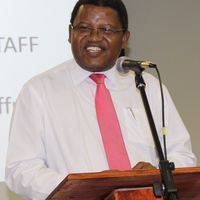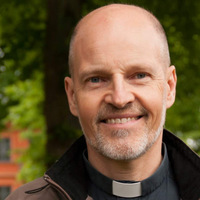
Graham A Duncan
Prof Graham Alexander Duncan received the degrees of Bachelor of Education (BEd) in Religious Studies (1971) and BD (Hons) Church History/Practical Theology (1977) from the University of Aberdeen, and the Certificate in Primary Education (Merit) and the Higher Diploma in Religious Education (Distinction); the degrees of Master of Theology (cum laude, 1977) and Doctor of Theology (2001) from UNISA; the degree of PhD (2007)and the PGCHE (Distinction, 2012) from the University of Pretoria.
He has taught at Albert Luthuli College of the Federal Theological Seminary of Southern Africa (Fedsem), the Faculty of Theology at the University of Fort Hare and the University of Pretoria where he was Professor and Head of the Department of Church History and Church Polity a position from which he retired in 2014.
He has successfully supervised 13 Master’s, 15 Doctor’s degrees and has mentored one Vice-Chancellor’s Post-Doctoral Fellowship. He was chosen by the students as Lecturer of the Year by Faculty of Theology students and Church History and Church Polity the best department in the Faculty of theology in 2013.
In 2013, he was awarded a C rating by the National Research Foundation (NRF). For 15 years he has been an Evaluator and Chair of Evaluation panels for the Council on Higher Education (CHE) and was appointed to the Specialist Panel for Religion and Theology of the NRF in 2015. He is a member of the South African Missiological Society (SAMS) and the Church History Society of Southern Africa He was also a member of the South African Council for Theological Education.
He has taught at Albert Luthuli College of the Federal Theological Seminary of Southern Africa (Fedsem), the Faculty of Theology at the University of Fort Hare and the University of Pretoria where he was Professor and Head of the Department of Church History and Church Polity a position from which he retired in 2014.
He has successfully supervised 13 Master’s, 15 Doctor’s degrees and has mentored one Vice-Chancellor’s Post-Doctoral Fellowship. He was chosen by the students as Lecturer of the Year by Faculty of Theology students and Church History and Church Polity the best department in the Faculty of theology in 2013.
In 2013, he was awarded a C rating by the National Research Foundation (NRF). For 15 years he has been an Evaluator and Chair of Evaluation panels for the Council on Higher Education (CHE) and was appointed to the Specialist Panel for Religion and Theology of the NRF in 2015. He is a member of the South African Missiological Society (SAMS) and the Church History Society of Southern Africa He was also a member of the South African Council for Theological Education.
less
Related Authors
Stuart Bate
St Josephs Theological Institute
Simangaliso R Kumalo
University of KwaZulu-Natal
Jakub Urbaniak
University College Dublin
Ignatius Swart
University of the Western Cape
Swart Ignatius
University of South Africa
Anders Göranzon
University of KwaZulu-Natal
InterestsView All (27)








Uploads
Papers by Graham A Duncan
Scotland in 1856, was, by any standards, a conflicted character. He stood both in and between
two worlds and suffered from the vulnerability that emerged from his dual allegiances. Yet he
made a significant contribution to the mission history of South Africa, particularly through his
early influence on the development of black consciousness and black nationalism, which were
to make significant contributions to black thinking in the 20th century. Soga’s life and ministry
are set in the context of Michael Ashley’s concept of ‘universes in collision’.
since it was conceptualised following the 16th-century reformations. A significant problem
caused by the missionary movement was the imposition of a Western-style approach to
theology, liturgy and polity with little regard for the cultures that were being invaded and
diminished. This article examines the hermeneutical problem in the African context, as well as
the concept of and practice of inculturation, and proposes a way forward on the basis of
faithfulness to the semper reformanda principle.
century. He was born, raised and educated in South Africa, and he lived, worked and
died in South Africa. He possessed a multi-cultural identity. He had a rare academic
ability but was no academic recluse. His varied and intensive ministry was marked
by committed, responsible, constructive engagement. He was a convinced yet
reasonable ecumenist with a powerful social conscience who offered a great deal
to the field of theological education. He had a vision of a responsible church which
was responsible in a practical way by working through the live issues of the day.
This would be a church which would strive for authentic unity and be the leaven in
the lump of the world.
back in some quarters. Yet, Western-based theological education remains the norm globally.
The Faculty of Theology at the University of Pretoria exemplifies this norm despite its
commitment to Africanisation. This article will consider transformation through the lens of the
leadership of Prof. Johan Buitendag, who has led the transformation initiative from his own
shared leadership perspective as dean since 2010. Change in the faculty will be analysed
through analysis of the faculty plans, with particular reference to teaching, learning and
research. Consideration will be given to a more radical proposal for future transformation
under the initiative of Africanisation.
Dutch Reformed Church and other individuals and bodies during the period 1975–1985. It does
this through investigating the editor’s approach to South African affairs and the nature of
contributions that he published. Significantly different views were expressed by those who had
lengthy exposure to the South African context as missionaries of the CoS and ‘tourists’ (holiday
makers, relatives of residents in South Africa and church visitors). As the period progressed,
changing attitudes are discerned that came more and more into line with the anti-apartheid
stance of the General Assembly expressed through its boards and committees.
the fields of society, politics, church and education. He is remembered mainly for his reform of
the church but he also made a significant contribution to the reform of education, which has
lasted until the present day and has impacted on other contexts. Although much of his vision
was not realised during his lifetime, his mission continued nonetheless. He was a product of
the late Medieval age and his transformation was completed by his experience alongside John
Calvin in Geneva. This was then contextualised in his own Scottish situation. Here we examine
his work in the field of education with particular reference to the First Book of Discipline. The
outcome of his labours was a compulsory, universal system of free education, which involved
character formation and enabled all to achieve the limit of their potential.
autonomous churches were established in South Africa following the upsurge of
Ethiopian and other types of African initiated churches at the close of the 19th century in
opposition to the European sending churches. It will also examine how the emerging
Partnership in Mission policy affected the process of integration of church and mission. Using
the closing years of the Church of Scotland South African Joint Council (1971–1981) as a case
study, the author examines primary sources to uncover the exercise of power demonstrated
through racism manifested in the disposition of personnel, property and finance to control the
development of authentic autonomy.
automatically think of the outstanding work of the South African Council of Churches
during the years of apartheid. However, it had two precursors in the General Missionary
Conference of South Africa (1904–36) and the Christian Council of South Africa (1936–68).
Parallel yet integral to these developments we note the significant contribution of the South
African Catholic Bishops’ Conference. These did not originate or exist in a vacuum but
responded to the needs and currents in society and were active in the midst of para-movements
such as the Christian Institute.
by interrogating one source written from within the Presbyterian Church of Southern Africa dealing with the period, 1960–1990.
use of credentials has developed over time. Using primary sources in the main, this article
examines the use of credentials as a tool for ‘inclusion’ or a means of ‘exclusion’, or both, in e history of the largest Presbyterian church in Southern Africa and its predecessors. The research question under study is to what degree, if any, were credentials used to control
ministers and to cleanse and purify the church of radical – such as anti-apartheid – elements?
opposition to the European sending churches. It will also examine how the emerging Partnership in Mission policy affected the process of integration of church and mission. Using the closing years of the Church of Scotland South African Joint Council (1971–1981) as a case study, the author examines primary sources to uncover the exercise of power demonstrated through racism manifested in the disposition of personnel, property and finance to control the development of authentic autonomy.
the fields of society, politics, church and education. He is remembered mainly for his reform of
the church but he also made a significant contribution to the reform of education, which has
lasted until the present day and has impacted on other contexts. Although much of his vision
was not realised during his lifetime, his mission continued nonetheless. He was a product of
the late Medieval age and his transformation was completed by his experience alongside John
Calvin in Geneva. This was then contextualised in his own Scottish situation. Here we examine
his work in the field of education with particular reference to the First Book of Discipline. The
outcome of his labours was a compulsory, universal system of free education, which involved
character formation and enabled all to achieve the limit of their potential.
autonomous churches were established in South Africa following the upsurge of
Ethiopian and other types of African initiated churches at the close of the 19th century in
opposition to the European sending churches. It will also examine how the emerging
Partnership in Mission policy affected the process of integration of church and mission. Using
the closing years of the Church of Scotland South African Joint Council (1971–1981) as a case
study, the author examines primary sources to uncover the exercise of power demonstrated
through racism manifested in the disposition of personnel, property and finance to control the
development of authentic autonomy
Scotland in 1856, was, by any standards, a conflicted character. He stood both in and between
two worlds and suffered from the vulnerability that emerged from his dual allegiances. Yet he
made a significant contribution to the mission history of South Africa, particularly through his
early influence on the development of black consciousness and black nationalism, which were
to make significant contributions to black thinking in the 20th century. Soga’s life and ministry
are set in the context of Michael Ashley’s concept of ‘universes in collision’.
since it was conceptualised following the 16th-century reformations. A significant problem
caused by the missionary movement was the imposition of a Western-style approach to
theology, liturgy and polity with little regard for the cultures that were being invaded and
diminished. This article examines the hermeneutical problem in the African context, as well as
the concept of and practice of inculturation, and proposes a way forward on the basis of
faithfulness to the semper reformanda principle.
century. He was born, raised and educated in South Africa, and he lived, worked and
died in South Africa. He possessed a multi-cultural identity. He had a rare academic
ability but was no academic recluse. His varied and intensive ministry was marked
by committed, responsible, constructive engagement. He was a convinced yet
reasonable ecumenist with a powerful social conscience who offered a great deal
to the field of theological education. He had a vision of a responsible church which
was responsible in a practical way by working through the live issues of the day.
This would be a church which would strive for authentic unity and be the leaven in
the lump of the world.
back in some quarters. Yet, Western-based theological education remains the norm globally.
The Faculty of Theology at the University of Pretoria exemplifies this norm despite its
commitment to Africanisation. This article will consider transformation through the lens of the
leadership of Prof. Johan Buitendag, who has led the transformation initiative from his own
shared leadership perspective as dean since 2010. Change in the faculty will be analysed
through analysis of the faculty plans, with particular reference to teaching, learning and
research. Consideration will be given to a more radical proposal for future transformation
under the initiative of Africanisation.
Dutch Reformed Church and other individuals and bodies during the period 1975–1985. It does
this through investigating the editor’s approach to South African affairs and the nature of
contributions that he published. Significantly different views were expressed by those who had
lengthy exposure to the South African context as missionaries of the CoS and ‘tourists’ (holiday
makers, relatives of residents in South Africa and church visitors). As the period progressed,
changing attitudes are discerned that came more and more into line with the anti-apartheid
stance of the General Assembly expressed through its boards and committees.
the fields of society, politics, church and education. He is remembered mainly for his reform of
the church but he also made a significant contribution to the reform of education, which has
lasted until the present day and has impacted on other contexts. Although much of his vision
was not realised during his lifetime, his mission continued nonetheless. He was a product of
the late Medieval age and his transformation was completed by his experience alongside John
Calvin in Geneva. This was then contextualised in his own Scottish situation. Here we examine
his work in the field of education with particular reference to the First Book of Discipline. The
outcome of his labours was a compulsory, universal system of free education, which involved
character formation and enabled all to achieve the limit of their potential.
autonomous churches were established in South Africa following the upsurge of
Ethiopian and other types of African initiated churches at the close of the 19th century in
opposition to the European sending churches. It will also examine how the emerging
Partnership in Mission policy affected the process of integration of church and mission. Using
the closing years of the Church of Scotland South African Joint Council (1971–1981) as a case
study, the author examines primary sources to uncover the exercise of power demonstrated
through racism manifested in the disposition of personnel, property and finance to control the
development of authentic autonomy.
automatically think of the outstanding work of the South African Council of Churches
during the years of apartheid. However, it had two precursors in the General Missionary
Conference of South Africa (1904–36) and the Christian Council of South Africa (1936–68).
Parallel yet integral to these developments we note the significant contribution of the South
African Catholic Bishops’ Conference. These did not originate or exist in a vacuum but
responded to the needs and currents in society and were active in the midst of para-movements
such as the Christian Institute.
by interrogating one source written from within the Presbyterian Church of Southern Africa dealing with the period, 1960–1990.
use of credentials has developed over time. Using primary sources in the main, this article
examines the use of credentials as a tool for ‘inclusion’ or a means of ‘exclusion’, or both, in e history of the largest Presbyterian church in Southern Africa and its predecessors. The research question under study is to what degree, if any, were credentials used to control
ministers and to cleanse and purify the church of radical – such as anti-apartheid – elements?
opposition to the European sending churches. It will also examine how the emerging Partnership in Mission policy affected the process of integration of church and mission. Using the closing years of the Church of Scotland South African Joint Council (1971–1981) as a case study, the author examines primary sources to uncover the exercise of power demonstrated through racism manifested in the disposition of personnel, property and finance to control the development of authentic autonomy.
the fields of society, politics, church and education. He is remembered mainly for his reform of
the church but he also made a significant contribution to the reform of education, which has
lasted until the present day and has impacted on other contexts. Although much of his vision
was not realised during his lifetime, his mission continued nonetheless. He was a product of
the late Medieval age and his transformation was completed by his experience alongside John
Calvin in Geneva. This was then contextualised in his own Scottish situation. Here we examine
his work in the field of education with particular reference to the First Book of Discipline. The
outcome of his labours was a compulsory, universal system of free education, which involved
character formation and enabled all to achieve the limit of their potential.
autonomous churches were established in South Africa following the upsurge of
Ethiopian and other types of African initiated churches at the close of the 19th century in
opposition to the European sending churches. It will also examine how the emerging
Partnership in Mission policy affected the process of integration of church and mission. Using
the closing years of the Church of Scotland South African Joint Council (1971–1981) as a case
study, the author examines primary sources to uncover the exercise of power demonstrated
through racism manifested in the disposition of personnel, property and finance to control the
development of authentic autonomy